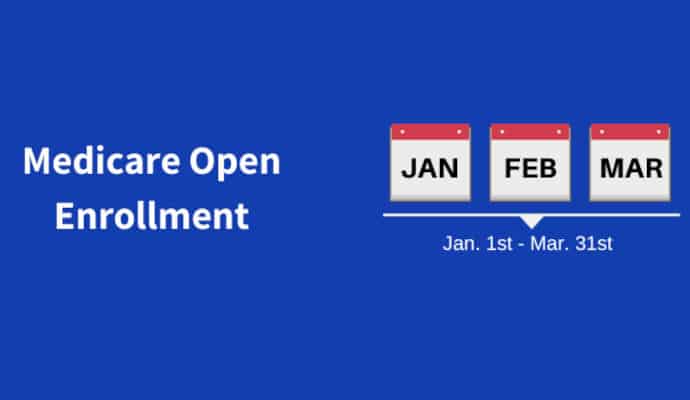
If their Medicare Advantage plan isn’t working out as expected, seniors have a chance to make changes during the Open Enrollment period. MedicareFAQ explains what can be changed from January 1 through March 31, why someone might want to make changes, and how switching plans works.
Many seniors have chosen to enroll in Medicare Advantage plans instead of in Original Medicare.
But after enrollment, some may find that their new Medicare Advantage coverage isn’t what they expected and would prefer to switch to another plan immediately.
Luckily, an additional Medicare Advantage Open Enrollment Period from January 1 through March 31, 2021 offers an opportunity to make plan changes.
Find out about what can be changed during this period, 3 essential things to know about making changes, why someone might want to change plans, how switching plans works during this time, and additional Medicare enrollment periods.
Medicare Advantage Open Enrollment Period: Jan 31 – Mar 31
The Medicare Advantage Open Enrollment Period is one of a few enrollment periods available for Advantage plans (also known as Medicare Part C).
It runs annually from January 1 through March 31.
During this time period, seniors enrolled in Medicare Advantage plans can do one of the following:
- Switch to another Medicare Advantage plan
- Disenroll from their Medicare Advantage plan
- Switch from one Medicare Advantage Prescription Drug Plan to another Medicare Advantage Prescription Drug Plan
If they choose to disenroll, they will go back to Original Medicare (Parts A and B) and can choose a prescription drug plan (Part D) if they wish.
The purpose of this Open Enrollment Period is to give beneficiaries a chance to change their coverage and not get stuck with a plan they’ve realized doesn’t meet their needs.
3 essential things to know about this Open Enrollment Period
1. Current enrollment is required
This Open Enrollment Period is only for people who are currently enrolled in a Medicare Advantage plan.
People who aren’t enrolled in an Advantage plan can't make changes during this time.
2. Only ONE change is permitted
During this timeframe, only one change can be made. That’s why it’s so important to make an informed decision by estimating upcoming healthcare needs and evaluating coverage options.
Unless the person qualifies for a Special Enrollment Period, their next chance to make changes is the Medicare Annual Enrollment Period, which begins on October 7 and runs through December 15 each year.
The Annual Enrollment Period allows people to make multiple changes that will take effect on January 1 of the following year.
3. Medical underwriting may be required for Medigap
Medical underwriting could be required when someone switches to Medigap after disenrollment from a Medicare Advantage plan.
Medigap is Medicare Supplement Insurance that helps fill “gaps” in Original Medicare and is sold by private companies.
But when switching from Medicare Advantage to Original Medicare, the “guaranteed-issue” rights for Medigap are lost.
Guaranteed-issue rights ensure that a person can buy any plan sold in their state and won’t be charged higher premiums based on health status. People generally have guaranteed-issue rights for six months when they’re both 65 or older and enrolled in Medicare Part B.
Without the guaranteed-issue rights, an insurance company may require medical underwriting before it sells the plan.
During medical underwriting, the insurer looks at past medical history and current health status.
If the company determines the risk of coverage is too high, it can refuse to sell the chosen plan or it may charge much higher premiums for the coverage.
Why someone might disenroll from a Medicare Advantage plan
Medicare Advantage plans can be attractive to enrollees because they come with additional benefits that aren’t offered by Original Medicare (Part A and Part B).
The plans also must include everything that Original Medicare covers.
But there are drawbacks to Medicare Advantage plans that might cause someone to want to disenroll during the January – March Open Enrollment Period.
Disadvantages to Medicare Advantage plans include:
- Limited physician networks
- High out-of-pocket costs
- Benefits that are subject to change
- Surprise expenses that make the low monthly premium less attractive
- Plans that drop doctors from their networks
Seniors might find it more affordable to add a Medigap plan, which covers costs that Medicare doesn’t and also doesn't involve networks.
How disenrollment and switching plans works during the Open Enrollment Period
Switching to another Medicare Advantage plan during this timeframe causes disenrollment from the previous plan. If dropping the plan entirely, call the insurance company and let them know the last date of coverage.
When enrolling in a new Medicare Advantage plan, the coverage will start on the first of the following month. So, if someone applies for coverage in February, their plan will be effective March 1. And if they apply in March, coverage will start on April 1.
Additional Medicare enrollment periods
There’s some confusion about Medicare enrollment periods because there are several.
The other enrollment periods that apply to Medicare Part C are:
Initial Coverage Election Period
This is when someone is first eligible to enroll in an Advantage plan.
It starts three months before their 65th birthday and ends the month before their Part B is effective or three months after their 65th birthday, whichever comes later.
Annual Enrollment Period
When changes to Medicare Advantage and Medicare Part D plans are allowed each year for the following year.
This occurs annually between October 7 and December 15.
Special Enrollment Period
Specific circumstances that allow individuals to make changes to their Medicare coverage.
Recommended for you:
- Get Help with Medicare Questions from State Programs
- What Does Medicare Cover? Find Out Before the Bills Arrive
- 2021 Medicare Advantage Plans: The 3 Biggest Changes
Guest contributor: Lindsay Engle is the Medicare expert for MedicareFAQ. She has been working in the Medicare space since 2017. Lindsay is featured in many publications and writes regularly for other expert columns. She has a passion for sharing her expertise about Medicare to beneficiaries so they can be better prepared for healthcare costs after retirement. You can find her on YouTube, where she is featured on a channel for Medicare beneficiaries to become educated on all their options.
Image: Braden Insurance Agency Inc.
This article wasn’t sponsored and doesn’t contain affiliate links. For more information, see How We Make Money.
[optin-monster slug=”yxbytm35zhsdfopnw7qk”][optin-monster slug=”jvhyplxmb4umsjazxecn”]
About the Author
Lindsay Engle
Lindsay Engle is the Medicare expert for MedicareFAQ. She has been working in the Medicare space since 2017. She is featured in many publications and writes regularly for other expert columns. She has a passion for sharing her expertise on Medicare to beneficiaries so they can be better prepared for healthcare costs after retirement. You can find Lindsay on YouTube where she has a featured channel for Medicare beneficiaries to become educated on all their options.




